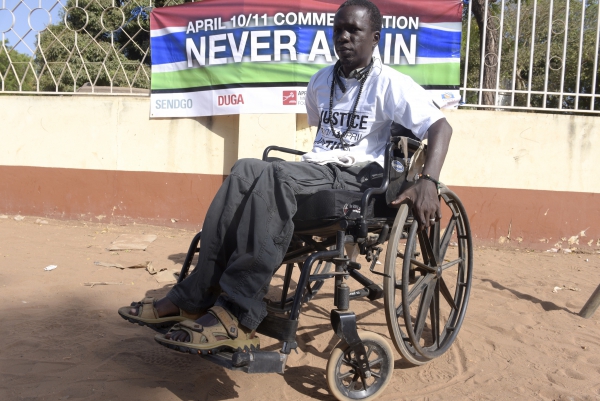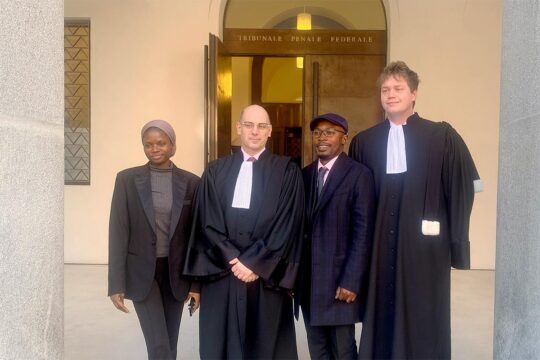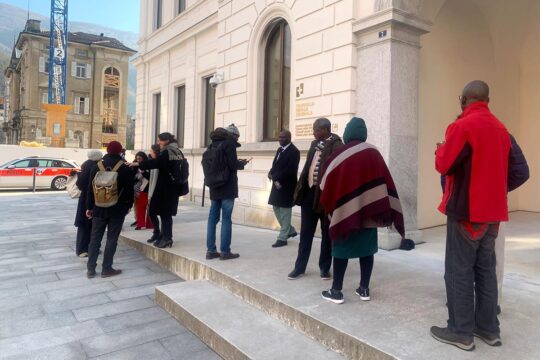As Gambia’s new authorities prepare to launch a Truth, Reconciliation and Reparations Commission, victims warn that there will be no reconciliation without justice.
The process leading to the appointment of 11 Commission members is expected to be complete by the end of February. These rare birds, people of moral standing who have never been involved in human rights abuses or active in a political party, should be in post by then. According to a guide released by the Justice Ministry in mid-January, five Commission members will be designated by the country’s president, five will be elected (one from each region) and one will be a youth representative. This team of 11 will have the heavy task of mending the tissue of Gambian society, torn apart by 22 years of iron-fisted rule under ex-dictator Yahya Jammeh.
Elsewhere in Africa, the transitional justice process has not always led to truth or justice. Gambians are therefore already warning against any reconciliation process that ignores the other two important aspects: justice and truth.
“Now we know the perpetrators, they must be brought to justice,” says Maly Ceesay, whose son Mamute Ceesay was disappeared in 2013 by Jammeh’s service secret, along with his friend Ebou Lobe.
“We need justice and truth”
In a video posted on line in early July 2017 by the Gambia Center For Victims Of Human Rights Violations, Mrs.Ceesay is not the only one insisting on victims’ need for justice. Her son Mamute, a Gambian who also obtained citizenship in the United States, was carried off in Gambia by Jammeh’s feared secret service in June 2013, along with his old friend Ebou Jobe, also a naturalised American. The two had returned to Gambia from the US a few weeks earlier to fulfil a dream of investing in the country and creating jobs there. But the two friends were forcibly disappeared before they even had time to set up their company.
“We want to know if they are dead or alive,” says Zainab Lobe, sister of Ebou Lobe, in the same video posted by the victims’ centre.
Madina Deen is a niece of Lamin Marong, arrested in April 2016 with Solo Sandeng during an anti-Jammeh demonstration in the capital Banjul. Lamin Marong was finally released after Jammeh’s fall in January 2017, but the torture suffered during his arrest and detention had taken their toll, and he died in March 2017. His niece Madina demands justice before reconciliation.
“We have suffered for too long, and now we want truth and justice,” she says. “We are calling on the new government to bring Jammeh back to face his crimes.”
In their fight for justice, victims of the former regime know they have the support of various international human rights organizations. In October 2017, they launched an international campaign on social media aimed at bringing the ex-dictator to justice, with the hashtag #Jammeh2Justice.
And in December, Human Right Watch called on Gambia’s National Assembly to “amend the Truth, Reconciliation and Reparations Commission bill to prohibit amnesties for those responsible for extrajudicial killings, enforced disappearances, rape, or torture, in accordance with international law and practice.”
“The bill permits the commission to grant amnesties to perpetrators who testify truthfully about their role in abuses,” says Human Rights Watch. “While it precludes amnesties for acts that `form part of a crime against humanity`, it does not rule them out for other serious crimes under international law.”
HRW and the victims’ coalition fear that the promise of amnesty for certain perpetrators could deprive some victims of their right to justice.
Gathering testimonies
While expressing the will to bring justice for victims, the new Gambian government also seems to be taking account of the need to gather as many testimonies as possible on the troubling events of Jammeh’s 22-year rule. The preamble to the bill, which has now been passed, says: “It is important to have an accurate and impartial historical record of the violations, [and] document them for posterity to ensure that ‘never again’ do we encounter a reoccurrence of such abuses.”
The promise of amnesty should reassure and encourage perpetrators and witnesses of certain categories of crimes to come and confess before the Commission. So will there be justice for their victims? The issue will no doubt be a hot one in Gambia when the time comes.
Yahya Jammeh finally stepped down from power in January 2017 under threat of a military intervention by the Economic Community of West African States (ECOWAS). The dictator had at first accepted his electoral defeat but then changed his mind and was trying to cling on. Since January 2017, he has been in exile in Equatorial Guinea. For his victims, bringing him back and trying him is a pre-condition for any reconciliation.





